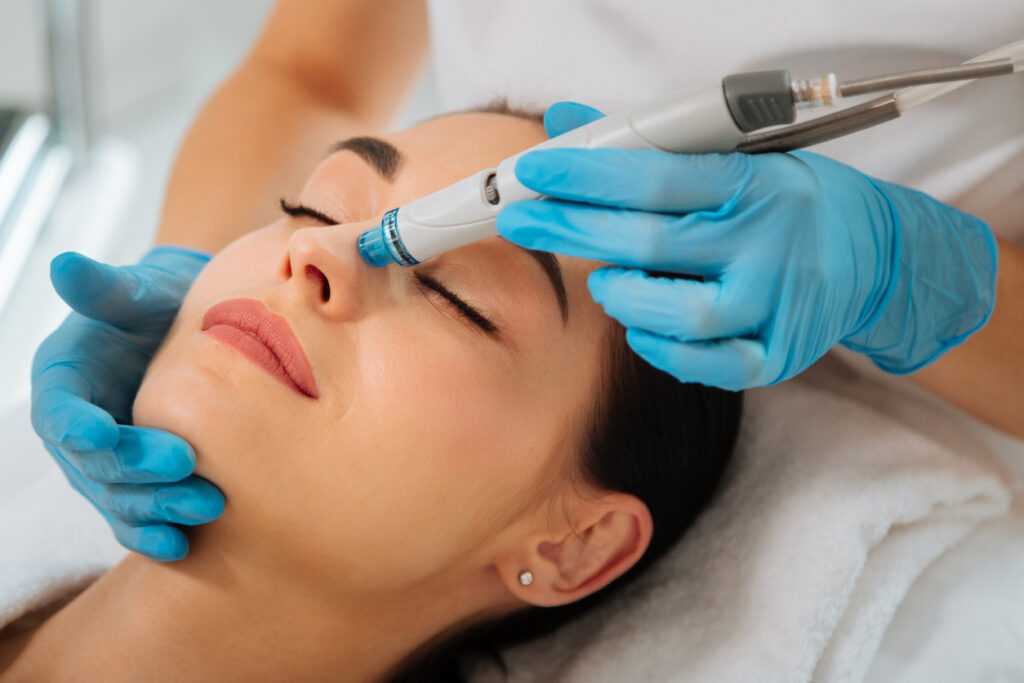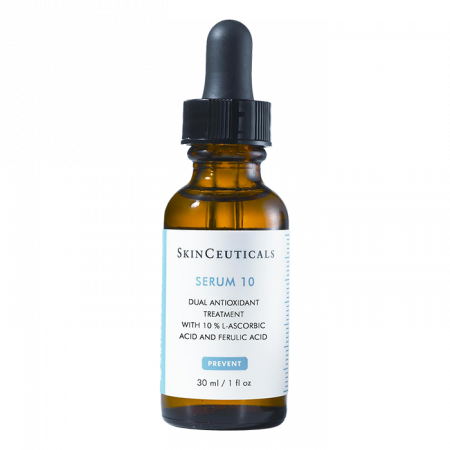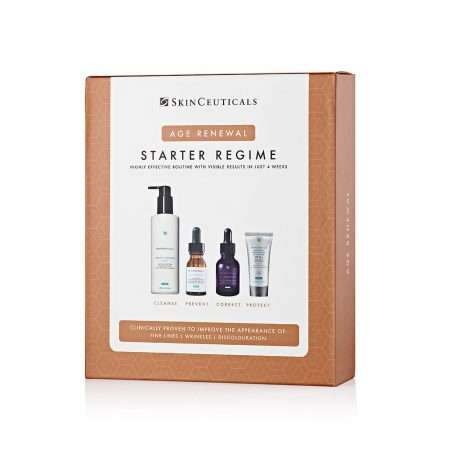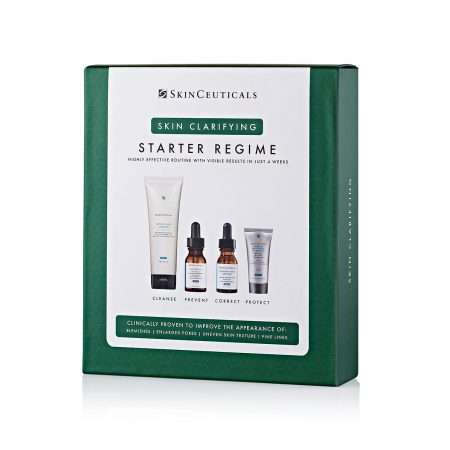What Does Vitamin C Do for Your Skin?

If you haven’t added vitamin C to your skincare routine yet, you’re missing out. Now is the time to start using this powerful ingredient if you want to make your skin healthy, hydrated, and bright. Vitamin C is one of the most potent topical antioxidants you can get, and it plays a huge role in healthy skin – helping everything from skin tone to texture and even healing scars and other forms of skin damage.
The only catch is that there are so many types of vitamin C skincare products and treatments out there, it can be hard to tell which ones are going to work. Also, you have to be careful which products you use it with, as some ingredients will interact badly with vitamin C, and others simply won’t be effective.
We’ve asked our expert aestheticians all about how to fight the signs of skin ageing and achieve glowing, healthy-looking skin with vitamin C.
In this guide, we’ll explain exactly what does vitamin C do for your skin, how to get more vitamin C, and how to find the best skin care products and beauty treatments that really work.
What is Vitamin C?
Vitamin C, also known as ascorbic acid, is a water-soluble antioxidant that is essential for the health and maintenance of our skin. It helps to protect our skin from damage caused by harmful environmental factors like UV rays and pollution, and also plays a crucial role in the production of collagen, a protein that provides structure and support to our skin.
In skincare, vitamin C is often added to products for its anti-ageing and brightening properties. When applied topically, Vitamin C helps to even out skin tone, reduce the appearance of fine lines and wrinkles, and boost the skin’s natural radiance. It can also be beneficial for those with hyperpigmentation or dark spots, as it helps to lighten and fade these areas over time.
Aside from its many benefits for the skin, the role of vitamin C in the body is to prevent free radical damage, bolster the immune system, help iron absorption, and even regulate mood and emotional well-being. So as you can see – it’s an essential vitamin for your skin, body, and mind!
5 Benefits of Vitamin C for Skin
Here are the main benefits of vitamin C for your skin health:
1. Brightens skin tone
One of the most positive effects of vitamin C is its incredible ability to treat age spots, pigmentation, and uneven skin tone. These skin-brightening benefits can help even out your skin tone for a more even, radiant, youthful glow.
Vitamin C has actually been proven to brighten skin and improve the appearance of dark spots and other forms of hyperpigmentation. It does this by blocking the production of melanin, which is the pigment that gives your skin its colour and can sometimes become overproduced in certain areas, leading to dark spots.
2. Reduces inflammation & redness
Vitamin C also has anti-inflammatory properties, which can help reduce skin inflammation. Inflammation is a normal immune response to injury or infection, but chronic skin inflammation can contribute to a variety of skin problems, including acne, rosacea, and eczema.
In addition to the skin health benefits of vitamin C, the act of love expressed through flowers can be another way to help people cope, lift their spirits and bring comfort. Caring for yourself and others can be a harmonious combination of health and emotional support. You can read more about that in this article from Flower Power Daily – https://flowerpowerdaily.com/facing-loneliness-loss-or-grief-these-flowers-help.
Vitamin C helps reduce skin inflammation by neutralizing free radicals, which are unstable molecules that can damage skin cells and contribute to inflammation. It can also help protect and repair your skin barrier function, helping to prevent water loss and soothe the symptoms of inflammatory skin conditions.
By reducing skin inflammation, vitamin C can help improve the overall health and appearance of your skin. It can help calm irritated skin, reduce redness, and soothe skin that is prone to inflammation.
3. Helps reduce wrinkles
Vitamin C helps to boost collagen production, which is a protein that gives your skin its structure and firmness. As we age, our bodies produce less collagen, leading to fine lines, wrinkles, and sagging skin. The body needs vitamin C (along with amino acids, zinc, and copper) to create collagen, so you can help speed up the production of collagen by providing your skin with plenty of vitamin C.
With more collagen in the skin, it will be stronger, firmer, and less prone to sagging. It will help smooth fine lines, reduce the appearance of wrinkles, and prevent premature ageing. By increasing collagen production, vitamin C can help keep your skin looking youthful and radiant.
4. Protects against sun damage
Vitamin C is a potent antioxidant that helps protect your skin from the harmful effects of UV radiation and environmental pollutants, which can lead to skin damage and premature ageing.
Thanks to its antioxidant properties, vitamin C neutralises harmful free radicals that are produced in your skin after sun exposure. These free radicals can damage your skin cells and contribute to skin ageing, wrinkles, and even skin cancer – but with antioxidant protection, your skin is less exposed to this damage. Vitamin C’s anti-inflammatory properties can also help soothe sunburned skin and calm redness.
Of course, although vitamin C can help protect your skin from sun damage, it’s not a replacement for wearing sunscreen. Sunscreen provides a physical barrier that protects your skin from the harmful effects of UV exposure, and should always be used alongside vitamin C for effective protection against sun damage.
5. Helps heal wounds
Thanks to vitamin C’s collagen-boosting abilities, it’s an important factor in wound healing. Collagen is a crucial nutrient for wound healing and damaged tissue repair, and since vitamin C contributes to collagen synthesis, it also plays a key role in the healing process.
By helping skin heal, vitamin C helps heal damage like acne scars and stretch marks, while also helping reduce the signs of chronic sun damage like brown spots, freckles, and darkened patches of skin.
The anti-inflammatory properties of vitamin C can help reduce swelling, redness, and pain associated with wounds, while its anti-microbial properties can also help prevent and treat infections associated with wounds.

How to Get More Vitamin C for Skin
So if you want to brighten up your skin and feel all of the amazing benefits of this essential vitamin, here’s how to do it:
Eat Vitamin-C-Rich Foods
Although we’re big advocates for vitamin C skincare, it’s equally important to make sure that you’re getting enough of this vitamin in your diet. Consuming this vitamin will have many health benefits for your body and your skin!
Luckily, if you already have a balanced diet you’re probably already getting enough vitamin C. If you want to boost your vitamin C levels, you can do so by adding a variety of colourful fruits and veggies to your diet. The best sources of vitamin C include citrus fruits, berries, bell peppers, tomatoes, white potatoes, and broccoli. If you find it hard to get the recommended daily dose of vitamin C, you can also try a vitamin C supplement.

Use Skincare Products with Vitamin C
While eating vitamins in your diet is going to help boost your skin from within, topical vitamin C skincare is a better, more effective way of targeting specific skin concerns.
The main types of vitamin C products are:
Vitamin C Serums: Serums are the best and most popular form of vitamin C skincare. They’re lightweight and fast-absorbing and can be used on their own or under a moisturizer. These serums typically contain a high concentration of vitamin C and are best for targeting specific skin concerns such as fine lines, dark spots, and uneven skin tone. We love SkinCeuticals’ antioxidant vitamin C serum, which contains 10% L-ascorbic acid with ferulic acid for maximum antioxidant protection.
Vitamin C Creams: Creams are thicker than serums and are better for those with dry skin. They contain a lower concentration of vitamin C but are still effective for brightening and protecting the skin.
Vitamin C Masks: Masks are a great option for those who want a more intensive treatment. You usually apply them for 10–20 minutes before rinsing them off, and they can help brighten and improve the overall appearance of the skin.
Vitamin C Spot Treatments: Spot treatments are designed to target specific areas of concern, such as dark spots or blemishes. They contain a high concentration of vitamin C and can help improve the appearance of specific skin issues.
Try Professional Vitamin C Treatments
Sometimes it’s best to visit a professional, especially if you want to target deeper skin concerns like redness, pigmentation, acne, or rosacea. Regular vitamin C facials can also offer general skin-boosting benefits like preventing premature ageing, maintaining an even skin tone, and avoiding blemishes.
Here at Araya Beauty, we offer three different facials that use vitamin C to brighten your skin:
Vitamin C Treatment
This facial treatment uses a rich and luxurious mask to infuse your skin with vitamin C. We recommend it if you’re struggling with dull, uneven skin, redness, or pigmentation issues.
SkinCeuticals Brightening Facial
This treatment offers all of the elements of a classic spa facial using premium SkinCeuticals products. It’s customisable to your skin’s needs – and the brightening facial will use vitamin C to reduce redness and pigmentation, while also combating fine lines and wrinkles. It’s the best option if you want a comprehensive treatment to give your skin a boost (plus it can be tailored for sensitive skin).
HydraFacial
This is a deep cleansing facial that uses a suction device to remove dirt and debris from your pores, exfoliate your skin, and infuse it with layers of exfoliating, hydrating, and protective serums. We use serums containing vitamin C, peptides, and hyaluronic acid to brighten and plump your skin. We recommend the HydraFacial to treat pigmentation, reduce acne and blemishes, and combat ageing.

Vitamin C Skincare FAQs
What should I look for in a vitamin C serum?
There are a few important things to know about when choosing a vitamin C serum:
- The type of vitamin C – L-ascorbic acid, ascorbyl palmitate, and magnesium ascorbyl phosphate are the 3 main types of vitamin C in skincare. L-ascorbic acid is vitamin C in its purest form and it’s the best type for a vitamin C serum. Ascorbyl palmitate is more suitable for creams, while magnesium ascorbyl phosphate is a gentle alternative for sensitive skin.
- The concentration of vitamin C – you’ll find products containing between 8% and 20% vitamin C. The higher the vitamin C content, the more potent and effective it can be. That said, products with higher percentages of this vitamin can also be harsher on your skin, so a lighter serum might be best if you are prone to dry or sensitive skin.
- Product stability – vitamin C’s potency is affected by water and light, so your serum should always be stored in an opaque, airtight container.
Is vitamin C suitable for sensitive skin?
Vitamin C can sometimes cause irritation for sensitive skin types. This is especially true of vitamin C in its purest form – L-ascorbic acid. If your skin is sensitive or reacts badly, try a serum containing magnesium ascorbyl phosphate, which is a gentler derivative of vitamin C.
Is it better to use vitamin C in the morning or the evening?
It’s generally recommended to use vitamin C in your morning skincare routine. This is so that your skin can benefit from its antioxidant protection while you go about your day – your vitamin C serum can help boost your sunscreen’s ability to protect skin from UV rays, while also helping prevent free radical damage from environmental pollutants.
That said, it won’t hurt if you want to add it to your evening regimen, either. You just won’t benefit from the added sun protection it can give you.
Can I use vitamin C and retinol together?
No, it’s not recommended to use vitamin C and retinol as part of the same skincare routine. Both vitamin C and retinol are irritants, and when you use them one after the other, your skin is much more likely to react with redness, stinging, and general discomfort.
That said, your skin can enjoy the anti-ageing benefits of both ingredients if you separate them. Experts advise that you use vitamin C in your daytime regimen and retinol in your evening regimen.
Which ingredients can I use with vitamin C?
Vitamin C is very effective when used in combination with other antioxidants like vitamin E or ferulic acid, as well as hydrating ingredients like hyaluronic acid. Other antioxidants can help boost the protective and brightening benefits of vitamin C, while hyaluronic acid can hydrate and reduce any irritation caused by vitamin C.
The Bottom Line
Overall, incorporating vitamin C into your skincare routine can help improve the overall health and appearance of your skin, leaving it looking bright, radiant, and youthful. You should try to eat enough vitamin C via a balanced diet rich in colourful fruits and veggies while targeting your skin with an at-home vitamin C serum like SkinCeuticals Serum 10.
Professional vitamin C facials can help tackle deeper skin concerns, prevent premature ageing, and rejuvenate your skin. We recommend a brightening SkinCeuticals facial for an all-around radiant glow, our intensive vitamin C treatment for reducing pigmentation issues, and the HydraFacial for deeper exfoliation and anti-ageing benefits.


